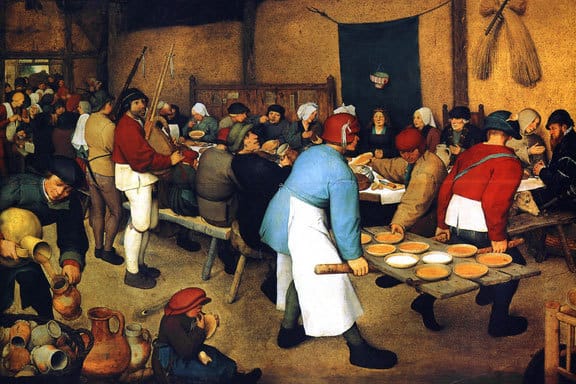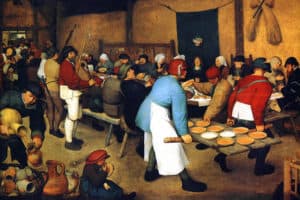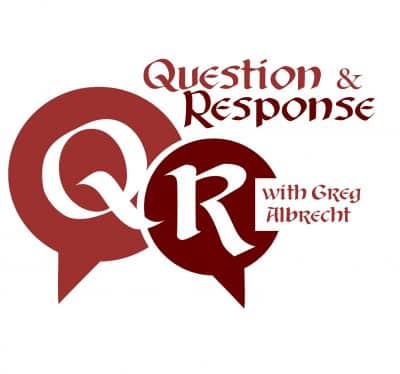Invite Them—Bring Them—Compel Them: The Escalating Compulsion of Grace – Brad Jersak
The Parable of the Great Supper
15 Now when one of those who sat at the table with Him heard these things, he said to Him, “Blessed is he who shall eat bread in the kingdom of God!”
16 Then He said to him, “A certain man gave a great supper and invited many,17 and sent his servant at supper time to say to those who were invited, ‘Come, for all things are now ready.’
18 But they all with one accord began to make excuses. The first said to him, ‘I have bought a piece of ground, and I must go and see it. I ask you to have me excused.’ 19 And another said, ‘I have bought five yoke of oxen, and I am going to test them. I ask you to have me excused.’ 20 Still another said, ‘I have married a wife, and therefore I cannot come.’
21 So that servant came and reported these things to his master. Then the master of the house, being angry, said to his servant, ‘Go out quickly into the streets and lanes of the city, and bring in here the poor and the maimed and the lame and the blind.’
22 And the servant said, ‘Master, it is done as you commanded, and still there is room.’23 Then the master said to the servant, ‘Go out into the highways and hedges, and compel them to come in, that my house may be filled. 24 For I say to you that none of those men who were invited shall taste my supper.’”
Authentic Invitation, Free Response, Escalating Compulsion
Prior to and aside from the horrific notion that God pre-selects some to eternal life and others to everlasting damnation, historic Christianity held high God’s desire that everyone is invited and that all would freely respond to his grace.
And the Spirit and the bride say, “Come!” And let him who hears say, “Come!” And let him who thirsts come. Whoever desires, let him take the water of life freely. (Revelation 22:7)
God’s invitation is authentically universal (“whoever desires”) and wholly uncoerced (“take freely”).
With that firmly in mind, what are we to make of the Parable of the Great Banquet, where Jesus describes an escalating use of pressure in the invitation?
- Group 1 – At first, the Man/Master (God) INVITES “many” to his banquet—he announces that “all things are now ready.” But the RSVPs are not coming in as hoped. Jesus labels these responses “excuses.” They are meant to sound absurd. Who takes out a mortgage on a property sight unseen or buys five oxen before test-driving them? And who gets married but doesn’t think the invitation includes their spouse as the “plus-one” to bring along? Jesus wants us to know this first group are not merely busy—their polite excuses communicate real rejection.
- Group 2 – The second invitation is not to the general “many,” but to a second group: “the poor, the maimed, the lame and the blind.” It sound like more than an invitation. There’s a greater urgency—“Go out quickly to the streets and lanes of the city.” And the Servant (singular, for God the Father is sending Christ himself) is to BRING Why is that? First, notice that these are impoverished people with disabilities who need someone to bring them. Willingness isn’t the issue—mobility is. And from where? Why are the poor and disabled in the streets and lanes? In the context of his culture, Jesus clues us in—these are likely lower-caste, infirmed beggars. In any case, something more than an invitation is required. Even if they willingly respond, they still need someone—a care-giver or Good Samaritan if you will—to pick them up and bring them in.
- Group 3 – But even then, some place settings remain vacant. The Master tells the servant to go out further—beyond the lanes and city streets to the highways and hedges. But it’s more than geographic. The implication is that the Servant should go further out into the margins of society. The preachers and commentators of yesteryear saw in this third campaign a call to the “sinners”—those who never got invitations because they were excluded by sin—society’s dregs, the perverted and the treacherous. The social untouchables that the Gospels exemplified by “tax collectors and prostitutes.” And these, the Master says, must be COMPELLED.
Anankazo—to Compel
But wait—isn’t a free–will response of utmost importance? And isn’t “compelling” sort of like forcing? Traditionally, the Greek verb here, anankazo, did carry the force of necessitate, compel, constrain, drive to—even force, sometimes with threats. But the best New Testament Greek Lexicon (BDAG), also considers the context of the word for weaker nuances: strongly urging, attempting to persuade or entreaty. That makes most sense here—the Servant doesn’t arrest, cuff and drag these folks to the banquet by force. He didn’t do that to the excuse–makers. But then why the need to compel this group? Have you ever tried to persuade someone who is reluctant to freely respond to an invitation? Without using force on them, you might nevertheless find yourself pleading: “You should really come! Please! You know you want to!”
Why hadn’t this level of compulsion been used on the first group? Because they didn’t want to come. They were free to come but made up reasons not to. In this latter group, the very opposite is true. These folks would dearly love to come, but because of years of socio–religious exclusion, they’ve lost hope and need to be convinced—freed, in fact—to receive God’s welcome! Their sense of “I can’t” had been imposed on them by others. But even their broken lifestyles betrayed a deep hunger for belonging, or a need to dull that hunger by illicit means. And now, to them, the invitation might seem too good to be true. Compel them! says the Master—and so the Servant does. Thus compelled, they not only come freely, they probably come running!
This parable reflects not only Christ’s move from the religious in–crowd to the social pariahs, but also from the Jewish Temple’s rejection of Christ to the Gentile inclusion in the Church. But that is a conversation for another time.
How does this compelling grace look today? The economically wealthy and the religious elite may presume upon God’s blessing but find Jesus’ actual invitation distasteful, especially when it means caring for the perpetually poor or the chronically disabled—or worse, having to rub shoulders with society’s “riff–raff” and their crazy–making dramas. Don’t ever doubt that we live in a caste–system, but understand that Jesus is most often found schmoozing with the “wrong crowd.
Compelled Invitations Today
Having known both sides of that table, I can testify to my own experience of gospel compulsion—not Calvinism’s irresistible grace, but grace’s compelling persuasion. I regularly see it come in two ways:
1. Through servants of God who plead with me to receive his mercy and forgiveness, grace and kindness, especially when I’m convinced that I’m worthless and disqualified—when I’ve believed the accuser and participated in self–rejection. You may know that voice, too. When we buy into the lie of our exclusion, we need to be compelled by faithful friends who remind us of the gospel. As the Mumford and Sons song goes,
It seems that all my bridges have been burned,
But you say ‘That’s exactly how this grace thing works,’
It’s not the long walk home that will change this heart,
But the welcome I receive with every start.
2. But the compelling invitation can take another, more perilous path. That happens when my resistance to grace and my stubborn self–will lead to consequences so painful that I don’t surrender until I bottom out. If at that point I surrender, my own failures compel me to return from the pigpen to the Father’s house. As Yoda says, “The greatest teacher, failure is.” Maybe, but while trials do compel a decision for repentance, it only ever happens when our self–will is broken and in a moment of clarity, we offer our willing response.
In other words, to summarize this parable and grace’s escalating invitation, the Master’s instruction to the Servant Jesus, “Compel them to come” is not a violation of my freedom, but a heightened opportunity for it. The only question for us is when we’d like to say our willing yes to the grace of God.
No hope for some?
The end of the parable begs a further question. What of Jesus’ ominous closing line: “For I say to you that none of those men who were invited shall taste my supper.” Ouch! Not one of them? Ever? Those who first rejected the invitation have no hope whatsoever. Or so it sounds.
But given Jesus’ free use of all/nothing, always/never hyperbole, we need to bear in mind texts like these:
“Yet at the same time many even among the leaders believed in him. But because of the Pharisees they would not openly acknowledge their faith for fear they would be put out of the synagogue” (John 12:42).
Does their waffling disqualify them? Perhaps, but then after Pentecost there are more:
“So the word of God continued to spread. The number of disciples in Jerusalem grew rapidly, and a great number of priests became obedient to the faith” (Acts 6:7).
Did these second–chance conversions stick? Are they exceptions to Jesus’ ‘rule’? Consider that Paul was initially in the “reject–Jesus camp,” he certainly came around:
“ 5 …circumcised the eighth day, of the stock of Israel, of the tribe of Benjamin, a Hebrew of the Hebrews; concerning the law, a Pharisee; 6 concerning zeal, persecuting the church; concerning the righteousness which is in the law, blameless. 7 But what things were gain to me, these I have counted loss for Christ.” (Phil. 3:5–7).
In light of these responses, how do we hear the Master’s words: “None of these men you were invited will taste my supper?” Do the facts finally contradict Jesus’? (I don’t think so.) Are the Master’s words confined only to the characters in the story? (I don’t think so.) Is it simply matter of Jesus’ love of hyperbole—a way to intensify the rhetorical effect for listeners? (Perhaps, but not simply so.)
Changing Crews
Proposal: God honors the wishes of those who decline his invitation—he doesn’t force anyone who refuses to enter God’s kingdom. God doesn’t constrain anyone who says no to following Christ (see Luke 14:25–24). The Psalmist once promised that God would grant us the desires of our heart, but that’s also a dire warning—take care with your desires. And so we’re taught to guard our hearts.
Read this part twice: So, those in group 1 (the decliners) who DON’T WANT to come will never experience eternal life in Jesus Christ ... unless and until they abandon the first group.
The good news from Paul’s life is that no one need be stuck in group 1 permanently. Anyone and everyone can leave it at any time (perhaps even at the final judgment when “every eye shall see him”).
On the Road to Damascus, Paul is struck blind by his vision of Christ and he must be brought to Ananias of Damascus, where Paul ultimately says his free yes to God’s amazing grace. As a blind man being brought to the banquet of grace, Paul now finds himself part of group 2 in the parable. As a member of group 1, he would never taste of the banquet, but when circumstances changed, so could he.
We might also see Paul falling into group 3 of the parable. The Servant (Jesus) goes out to confront Paul on a “highway” and “compels him” to join the gospel banquet. When he finds Paul, Christ describes him as an ox “kicking against the goads” of his own stubbornness and misplaced religious zeal. In that moment, Paul bottoms out on his self–defeating behavior—he’s freed to exit group 1, freely confesses Christ as Lord and is soon baptized freely into the faith.
Thus, Paul becomes our case–study, demonstrating the Master’s authentic invitation, our free response, but also how Jesus the Servant visits us with an escalating persuasive grace. And this, I believe, has been the story of many of us. As long as we didn’t want to come in, we couldn’t. But thanks be to God, life circumstances (and especially our failures) made us ready for grace to come calling. And then it did, and his name was Jesus.
Lord and Master, thank you for your invitation to the gospel feast. Thank you for sending your Servant Jesus to find me and to compel me to come. In gratitude, I offer my free yes to your grace. Amen












 Plain Truth Ministries | Box 300 | Pasadena, CA 91129-0300
Plain Truth Ministries | Box 300 | Pasadena, CA 91129-0300

